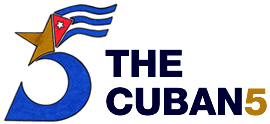The Los Angeles Times published the following article Aug. 19 on the Cuban Five. Articles appeared in other press from Reuters and AP articles, including the Miami Herald. The September 23 March in Washington DC and forum are mentioned in the articles.
ANTI-CASTRO DISCLOSURES COULD HELP ‘CUBAN FIVE’
Convicted in Miami on espionage charges five years ago, the exiles may still win a new trial
by Carol J. Williams
Reprinted from the Los Angeles Times
August 19, 2006
MIAMI — Attorneys for five Cubans convicted of espionage are hoping new disclosures about exile-sponsored plots to kill Fidel Castro could win a new trial for the men, now serving sentences of 15 years to life in maximum-security prisons.
More than five years after their convictions, the case of the Cuban Five — or the Five Heroes, as they are known throughout Cuba — remains a cause celebre on both sides of the Florida Straits. Havana authorities cast the five as victims of exile vengeance. Many Cuban Americans here see them as Castro emissaries bent on undermining U.S. security.
The Cubans fought the federal charges of conspiracy to commit espionage during their 2001 trial by arguing that they were here to infiltrate radical Cuban exile groups that had devised and executed dozens of missions to topple the Communist government in Cuba, or at least its bearded leader.
Among the developments is the admission by Jose Antonio Llama, a 75-year-old exile, that he financed a 1997 mission to kill Castro for which he had already been tried and acquitted.
In addition to Llama’s admission, Robert Ferro, a Cuban exile in Upland, Calif., said in April that he collected 1,500 guns and grenades for an assault on Cuba during U.S. military exercises in the Caribbean in May. Ferro was charged with illegal weapons possession. And trial begins next month in the case of Miami developer Santiago Alvarez on charges of amassing guns last year for an attack on Castro.
“We are following these new developments and when we feel we are closer to having the full story, we will be bringing it to a court’s attention,” said Leonard Weinglass, the civil rights attorney handling appeals for Antonio Guerrero, who is serving a life sentence in Colorado. “But it’s not quite ripe for action yet.”
The New York-based National Committee to Free the Cuban Five has conscripted high-powered legal help from the National Lawyers Guild and announced a Sept. 23 march in Washington to demand that President Bush free the Cubans.
“The Five should never have been arrested. They were fighting terrorism,” said Gloria La Riva, committee coordinator. “New terrorist plots have been revealed since their convictions in Miami which give further weight to the arguments that Miami was a place where they should never have been tried.”
Earlier this month, the 11th Circuit Court of Appeals in Atlanta rejected a new trial sought on grounds that the men’s 2001 process was conducted in a tainted venue: emotionally charged Miami after the Elian Gonzalez custody battle. The Aug. 9 ruling was a setback, but “not the end of the case — far from it,” said Weinglass.
He noted that the appeals court had yet to rule on nine challenges to the Miami federal court conviction.
Llama confirmed anti-Castro actions in interviews in recent weeks, including with The Times, in which he accused five different exiles of selling $1.4 million in equipment he bought for the 1997 operation.
The group planned to “eliminate” Castro during his visit to Venezuela’s Isla de Margarita that year, but the Puerto Rican Coast Guard intercepted Llama’s cabin cruiser ferrying four men and the weapons. Llama said his fellow plotters sold a cargo helicopter, 10 aircraft, seven boats and weapons while he was on trial in San Juan. He was later acquitted, for lack of evidence, of conspiracy to murder a head of state.
“I understand the implications” for bolstering the defense of the Cuban Five, Llama said of his admissions.
Richard Klugh, who represents Fernando Gonzalez, serving a 19-year sentence at a federal prison in Wisconsin, says the newly emerged anti-Castro actions could justify a new trial but alluded to growing disillusionment among defense attorneys.
“It all adds up, and it really should be filed,” Klugh said of the potential grounds for a new trial. “But I’m exhausted. I hate to complain. I pick up my paycheck. But this case really saps the life out of you.” Klugh points out the five were convicted of conspiracy to commit espionage without ever having spied. No evidence was presented suggesting any of the five had obtained classified information.
Three are serving life sentences, including alleged ringleader Gerardo Hernandez, found guilty of murder conspiracy based on allegations he provided intelligence to Havana that led to the deaths of four exiles shot down by Cuban MiGs in 1996.
“Were they here to hurt the United States, or were they here to protect Cuba from crime and violence?” Klugh asks of the five. “It really goes to the core of the case.”






 English
English  Español
Español